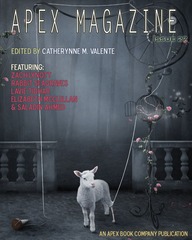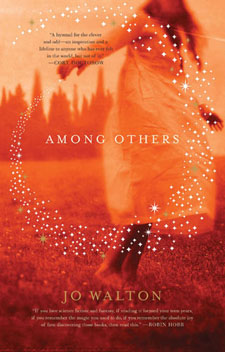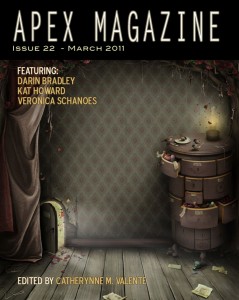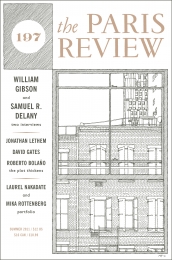 So everyone’s crying about the demise of Borders, though it wasn’t that long ago we were all crying about how it and evil twin Barnes and Noble were driving local independent bookstores out of business, even as we were shopping mostly at Amazon to get the books we found browsing at the physical bookstore at a better price (sinner, heal thyself). Like everyone else, I used to love going into the megastores, and maybe felt a little guilty about it, but not so much that I stopped doing it, because the small guys just didn’t have the inventory to browse through. Which is also why I used to like going into Tower Records, too, but the same thing that’s happening to the music megastore (of which “Borders ‘n Noble” was once a subset) is catching up to the bookstore. You want to browse inventory, you go online, for both selection and prices. And you don’t have to get into the car and drive anywhere to do it.
So everyone’s crying about the demise of Borders, though it wasn’t that long ago we were all crying about how it and evil twin Barnes and Noble were driving local independent bookstores out of business, even as we were shopping mostly at Amazon to get the books we found browsing at the physical bookstore at a better price (sinner, heal thyself). Like everyone else, I used to love going into the megastores, and maybe felt a little guilty about it, but not so much that I stopped doing it, because the small guys just didn’t have the inventory to browse through. Which is also why I used to like going into Tower Records, too, but the same thing that’s happening to the music megastore (of which “Borders ‘n Noble” was once a subset) is catching up to the bookstore. You want to browse inventory, you go online, for both selection and prices. And you don’t have to get into the car and drive anywhere to do it.
On a personal level, the Borders closing doesn’t affect me. Here in Charlottesville, we have more used bookstores per square foot than coffee shops, along with long established local retailer of new books and, yes, a Barnes and Noble (though not a superstore, meaning little in the way of music or video, though that’s being downsized anyway). And, truth, be told, it’s been a while since the Borders experience peaked; in an effort to become profitable, the chain started emphasizing mass merchandising over book selling, becoming more like a mall store than an intellectual haven, and there was nothing more idiotic than staff running around with those silly headsets to give the illusion of instant customer service.
The primary attraction of going into a Borders (and Tower and all the other megastores) was that feeling that you can get in your hands just about almost anything you wanted, no matter how esoteric, and that’s not quite the same thing as pressing “The Look Inside” link online. While as eReaders ultimately displace the physical book, that distinction may become less important, but whether chat rooms and customer reviews can replace the barista who can recite from Nietzche, Heinlein and Bob Dylan is another matter.
Nor is the experience disappearing entirely for bookstores (or record stores), but it’s going to be harder to find if you don’t live in Portland (Powell’s Books) or New York City (Strand, for example, which is cleverly offering a free gift at its store to anyone who comes in with a Borders Rewards card). These bookstores continue to survive because, unlike Borders, they haven’t tried to replicate their physical presence across the country like the Borg while still expanding their online footprint. Moreover, their brand identity distinguishes themselves from Amazon as knowledgable curators of their product (as opposed to a legion of Harriet Klausners and algorithms that tell you what you like based on past purchases). Therein may lie the future of the physical bookstore.
That and maybe Apple acquiring Barnes and Noble.
…
Read More Read More
 The new Interzone features “Insha’ Allah” by Matthew Cook, “For Love’s Delerium Haunts the Fractured Mind” by Mercurio D. Rivera, “The Walrus and the Icebreaker” by Jon Wallace, “Eleven Minutes” by Gareth L. Powell and “Of Dawn” by Al Robertson. There’s also an interview with Lisa Goldstein and the usual assortment of book and video reviews. as well as David Langford’s “Ansible Link” column.
The new Interzone features “Insha’ Allah” by Matthew Cook, “For Love’s Delerium Haunts the Fractured Mind” by Mercurio D. Rivera, “The Walrus and the Icebreaker” by Jon Wallace, “Eleven Minutes” by Gareth L. Powell and “Of Dawn” by Al Robertson. There’s also an interview with Lisa Goldstein and the usual assortment of book and video reviews. as well as David Langford’s “Ansible Link” column. NPR has posted its
NPR has posted its 
 Apex Magazine is a monthly on-line publication of science fiction, fantasy and horror edited by Catherynne M. Valente. The current issue features three stories: “The Whispered Thing” by Zach Lynott, “The Tiger Hunter” by Rabbit Seagraves, “The Secret Protocols of the Elders of Zion” by Lavie Tidhar and, continuing with titles that all start with “The,” poetry by Saladin Ahmed, “The Djinn Prince in America: A Micropic in 9 Tracks.” Jason Sizemore’s non-fiction piece is “Five Genre Books that Raise Mind-numbing Philosophical Questions.”
Apex Magazine is a monthly on-line publication of science fiction, fantasy and horror edited by Catherynne M. Valente. The current issue features three stories: “The Whispered Thing” by Zach Lynott, “The Tiger Hunter” by Rabbit Seagraves, “The Secret Protocols of the Elders of Zion” by Lavie Tidhar and, continuing with titles that all start with “The,” poetry by Saladin Ahmed, “The Djinn Prince in America: A Micropic in 9 Tracks.” Jason Sizemore’s non-fiction piece is “Five Genre Books that Raise Mind-numbing Philosophical Questions.” So everyone’s crying about the
So everyone’s crying about the 
 The Tiger’s Wife is an interlocking series of fabulist tales, set in an unnamed Balkan country that is obviously Yugoslavia before and after its dissolution into ethnic political states, which unfolds the life and death of the narrator’s grandfather. It’s a meditation on grief, cultural blindness and bigotry, among other things, but overarchingly the constant effort to try to live a decent life and see the decency in others, even those who seemingly don’t possess it. Written by Téa Obreht, whom The New Yorker named one of the twenty best American fiction writers under forty and the National Book Foundation’s “5 Under 35” list, it is, as you might expect given those accolades, considered a “literary” novel. Which is perhaps why you haven’t seen much mention of it in genre circles, despite the fact that it is a fantasy. However you want to classify it, it’s good and well-deserving of the hype it’s received. One thing that struck me that I don’t think I’ve seen mentioned is the similarity between Obreht and Ray Bradbury in his prime, back in the days when Clifton Fadiman was trying to sell The Martian Chronicles to the literary mainstream.
The Tiger’s Wife is an interlocking series of fabulist tales, set in an unnamed Balkan country that is obviously Yugoslavia before and after its dissolution into ethnic political states, which unfolds the life and death of the narrator’s grandfather. It’s a meditation on grief, cultural blindness and bigotry, among other things, but overarchingly the constant effort to try to live a decent life and see the decency in others, even those who seemingly don’t possess it. Written by Téa Obreht, whom The New Yorker named one of the twenty best American fiction writers under forty and the National Book Foundation’s “5 Under 35” list, it is, as you might expect given those accolades, considered a “literary” novel. Which is perhaps why you haven’t seen much mention of it in genre circles, despite the fact that it is a fantasy. However you want to classify it, it’s good and well-deserving of the hype it’s received. One thing that struck me that I don’t think I’ve seen mentioned is the similarity between Obreht and Ray Bradbury in his prime, back in the days when Clifton Fadiman was trying to sell The Martian Chronicles to the literary mainstream. Apex Magazine is a monthly on-line publication of science fiction, fantasy and horror edited by Catherynne M. Valente.
Apex Magazine is a monthly on-line publication of science fiction, fantasy and horror edited by Catherynne M. Valente. The June-July 2011
The June-July 2011  The June 20th edition of John Clute’s
The June 20th edition of John Clute’s  Congratulations to Realms of Fantasy on its 100th issue (which actually has 101 pages, but I guess the extra page is for good luck, and doesn’t make for quite the same alliterative headline), a notable accomplishment for a publication that has been brought back from the dead on several occasions. In fact, the magazine has had five publishers, with founding editor Shawna McCarthy the only person who has been there for the duration, according to the issue’s “Little Known Facts.” Fiction contributors include Leah Bobet, Josh Rountree and Samantha Henderson, Sharon Mock, Thea Hutchinson, Patrick Samphire, Euan Harvey and David D. Levine, as well as poetry by Ursula Le Guin and various art, book, gaming and movie reviews along with the regular Folkroots column by Theodora Gass. Here’s the complete
Congratulations to Realms of Fantasy on its 100th issue (which actually has 101 pages, but I guess the extra page is for good luck, and doesn’t make for quite the same alliterative headline), a notable accomplishment for a publication that has been brought back from the dead on several occasions. In fact, the magazine has had five publishers, with founding editor Shawna McCarthy the only person who has been there for the duration, according to the issue’s “Little Known Facts.” Fiction contributors include Leah Bobet, Josh Rountree and Samantha Henderson, Sharon Mock, Thea Hutchinson, Patrick Samphire, Euan Harvey and David D. Levine, as well as poetry by Ursula Le Guin and various art, book, gaming and movie reviews along with the regular Folkroots column by Theodora Gass. Here’s the complete  Tastemaker Central take particular pleasure in noting that the latter literary bastion has much of interest to the same people who read the bastion of fantasy genre tales (and perhaps vice versa?). The Summer 2011 features “Art of Fiction” interviews with Samuel R. Delany and William Gibson, as well as a story by Jonathan Lethem, “The Empty Room,” that’s available
Tastemaker Central take particular pleasure in noting that the latter literary bastion has much of interest to the same people who read the bastion of fantasy genre tales (and perhaps vice versa?). The Summer 2011 features “Art of Fiction” interviews with Samuel R. Delany and William Gibson, as well as a story by Jonathan Lethem, “The Empty Room,” that’s available